Go Vegan? Eeek! I love my red meat. I need my red meat. And I already consume a largely plant-based diet. Why on Earth would I want to consider such a disruptive change in lifestyle? Well, the Earth has something to do with it, certainly.
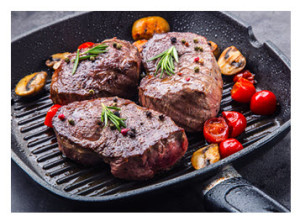 But for now, I’m asking myself: What if eating Vegan is less difficult than I think? And if I loathe animal cruelty and I think Big Food is handing me a raw deal — and worse, a raw deal to the environment — what would it take for me to ease into a more Vegan way of life?
But for now, I’m asking myself: What if eating Vegan is less difficult than I think? And if I loathe animal cruelty and I think Big Food is handing me a raw deal — and worse, a raw deal to the environment — what would it take for me to ease into a more Vegan way of life?
And what would the rewards and challenges be of sustaining it?
As one who loves the pleasures of the table, especially when à table in France, I pride myself on healthy, budget-friendly, and delicious cuisine for myself and my family. But I’m increasingly drawn to a more Vegan diet for a number of reasons.
Vegan? Vegetarian? Benefits and Risks
Given that dietary discussions can lead to emotionally charged debates, I looked on the web for what I consider ‘politically neutral’ information. This source clarifies the distinctions between vegetarian and vegan diets, while also listing the various risks and benefits.
Sufficient nutrients can be an issue in a vegetarian diet, specifically getting enough:
protein, iron, zinc, calcium, vitamin B12, vitamin D and omega-3 fatty acids
However, vegetarian diet advantages are many, and according to the American Heart Association, most vegetarian diets are:
… lower in fat, saturated fat and cholesterol than nonvegetarian diets. Studies have shown that vegetarians show lower risks of obesity, heart disease, high blood pressure, diabetes and even some forms of cancer.
A strict Vegan diet strives to eliminate all food products of animal origin. In addition to the nutritional elements to monitor in a vegetarian diet, it becomes critical to consider calcium and Vitamin D.
Yet if we already do so, I repeat: Isn’t achieving a Vegan diet easier than some of us think?
But I Love My Meat! I Need My Meat!
I decided to take a look at my food consumption patterns which, over the past few years, have become increasingly vegetarian, while not entirely eliminating meat. The reason is simple: When I eat this way, I feel good!
To me, a Vegan diet seems like it wouldn’t be too tough. But I thought I should sit down and really take a closer look at my typical weekly consumption of meat and dairy, and specifically foods from which I get vital protein, iron, and B vitamins.
 Here is my guesstimate of animal products consumed per week:
Here is my guesstimate of animal products consumed per week:
- 2 eggs
- 1 cup yogurt
- 1/2 small chicken breast
- 1 can of albacore tuna
- 1 medium grass-fed burger (2 meals for me)
- 2 lean turkey sandwiches (made at home, 4 meals for me)
Can I really manage without even these small portions of chicken, dairy, fish, and beef?
I’d like to think so.
Help! What About Nutrition?
As a nubie to even thinking about Veganism, what about nutrition?
This Vegan Society overview of nutritional needs gives me a start, including indications of plant-based food sources I wouldn’t have thought of otherwise, noting attention to iron and B vitamins, which I already knew, as well as calcium and D, which I already do.
Now about my usual eating habits, it looks like I don’t consume much. The fact is — I love to eat! I adore a variety of tastes, textures, flavors, and cuisines. And when my weight creeps up (too little sleep, too much stress, too much sugar so I can keep going), it’s my “non-diet” diet and patience that works the excess off again.
I am small in stature (barely 5’0), and I feel good at anything between 105 and 115 pounds. In addition to what I listed above, I eat fruit, veggies, nuts, spectacular salads, whole wheat bread, ultra-fabulous brown rice with quinoa, and yes, I enjoy the occasional martini and glass of red wine.
And… Like all the women I’ve known in my life, I’ve never met a piece of chocolate I didn’t love!
While I make a veggie omelet as a meal from time to time, I generally hard boil a couple of eggs and over the course of the week, add them to salad. As for yogurt, I eat a tablespoon or two which I mix with fresh fruit, or a tablespoon or two at night if I’m feeling hungry.
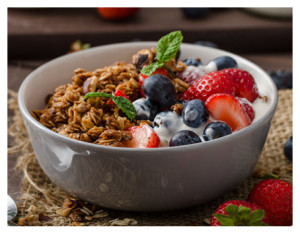 And I love my yogurt! Would that have to go, too?
And I love my yogurt! Would that have to go, too?
One Vegan friend recently pointed out a number of products made from other (plant-based) sources that would neatly replace my standard yogurt. (Encouraging news!)
Personal Health, Personal Decisions
As a woman at 50+ in good health, I take vitamin supplements that aren’t unusual. They include OTC calcium and D, both advisable for bone health, along with iron and B-12.
Looking solely at the beef and chicken that I consume, roughly 3/4 of a pound in total per week, I am hardly typical of the ‘meat every day’ crowd, much less the ‘meat at every meal’ tendency that is oh-so American. Just how atypical am I?
The Wall Street Journal Blog reports on average American meat consumption:
In 2012, the average American consumed 71.2 pounds of red meat (beef, veal, pork, and lamb) and 54.1 pounds of poultry (chicken and turkey), according to the U.S. Department of Agriculture. The average amount is likely a bit higher. The USDA doesn’t take into account vegetarians, who consistently represent about 5% of the population…
And those figures on meat consumption? How do they stack up to what we really need?
The same article elaborates on USDA guidelines:
The USDA recommends in its 2010 Dietary Guidelines for America 3.3 ounces—or 0.21 pounds—of meat per day of red meat, pork and poultry for the average adult on a 2,000 calorie diet. The average adult who consumes meat, according to our calculations, eats more like 0.36 pounds of meat per day… Keep in mind this calculation is for the total population, which includes babies and children, meaning that the average amount of meat consumed by adults is very likely a bit higher.
We are, on average, consuming far more red meat than necessary in a healthy diet.
Protein: How Much Do We Need?
Are we influenced by great marketing when it comes to animal agriculture? You bet. Who doesn’t remember “the incredible edible egg” commercial with its jaunty jingle still resident in memory?
As for the eggs in my diet, they offer nutritional advantages, or what Healthy Eating describes as “complete protein” (6.29 g / large egg).
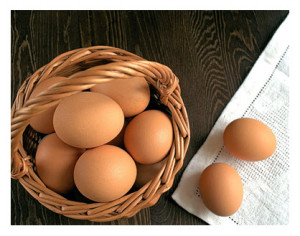 While we should be looking at a broad set of daily nutritional requirements, protein — vital to organs, muscles, and skin — is a good place to start.
While we should be looking at a broad set of daily nutritional requirements, protein — vital to organs, muscles, and skin — is a good place to start.
Using myself as an example, with roughly 13 g of protein per week in two eggs, another 9 g of protein from one cup of yogurt, and based on this Livestrong article on assorted meats, I estimate that my combined 3/4 lbs of beef and chicken deliver approximately 80 g of protein. A half cup of almonds / week (my usual) gives me another 15 g, and on the sandwich front (4 slices of turkey; two slices of cheese), I can reasonably adds 60 g of protein to my tally.
The total? 177 grams.
Hmm. Is that all? Have I forgotten to include something?
My 177 g / week of protein is 25 grams of protein per day, and I was generous in my estimates. That’s roughly half what’s recommended! For a relatively sedentary adult woman (despite 30 minutes / day of exercise), according to this article on protein requirements at Health.com, I should multiply my weight x .4 (an “active” female multiples by x .6), and at my current weight (112), I need 44.8 grams of protein per day.
My 25 grams / day estimated above?
Even if I’m off by a factor of 50%, putting me at 38 grams / day, I know one thing. If I believe what the dietary gurus are telling us, I need to pay greater attention to the nutritional value of what I’m eating, regardless of the “diet” I choose, and I need more protein, a more thorough calculation, or a nutritionist — stat!
My Plant-Based Diet Already Has Holes. Now What?
I used to eat more fish than I have in recent months, but that habit fell by the wayside last summer, and my increasingly plant-based diet represents my current norm. Considering my small size servings (and a few apparent nutritional holes), I must be extremely careful if I decide to go Vegan. And to be clear, I’ve been “dabbling” in exactly that for the better part of the past three weeks.
Generally speaking, so far so good.
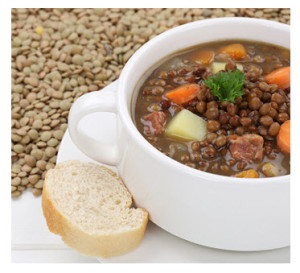 Compared to the figures referenced by the WSJ article, my red meat and poultry intake is — or was — well below the average American consumption of .36 lbs or 5.76 oz / day. But if I wish to remain closer to the Vegan end of the spectrum (and I do for several reasons; more on that tomorrow), how do I do so while still protecting my health?
Compared to the figures referenced by the WSJ article, my red meat and poultry intake is — or was — well below the average American consumption of .36 lbs or 5.76 oz / day. But if I wish to remain closer to the Vegan end of the spectrum (and I do for several reasons; more on that tomorrow), how do I do so while still protecting my health?
Bodybuilding.com has plenty to say on the subject of protein, identifying some of my favorite foods as top sources, including milk, cheese, yogurt, steak and lean ground beef.
Sadly, those aren’t plant-based! Way down the list, however, I see select options I love including lentils and nuts. I’m certain there are more, but clearly, I have research to do. And none of this addresses another area of need, which is those all-important omega-3s.
Information, Education, Opening Our Eyes
I make no claim to having done anything but scratch the surface of the information gathering required to responsibly alter my eating habits. Nor will I deny that many of us enjoy red meat, poultry, and fish in our cuisine.
At least, until or unless we begin to understand factory farming and environmental costs.
Human beings are omnivores. Omnivores eat foods of both plant and animal origins. But somewhere along the line, and certainly in the past 75 years, our taste for and our marketing of animal agriculture has far outpaced what is needed by our bodies.
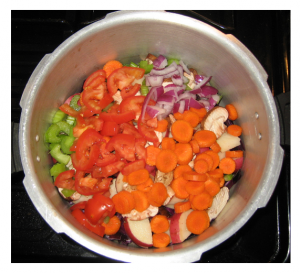 What I know about myself is this: Given my small size, my usual food consumption habits, and the fact that I already take supplements for vitamins that are typically at risk in a Vegan diet, my physician suggested that if I wish to go more “plant-based” than I currently am, that’s fine, but… I must pay attention to vitamins and iron. I should also watch my protein, and likely consult with a nutritionist if I possibly can.
What I know about myself is this: Given my small size, my usual food consumption habits, and the fact that I already take supplements for vitamins that are typically at risk in a Vegan diet, my physician suggested that if I wish to go more “plant-based” than I currently am, that’s fine, but… I must pay attention to vitamins and iron. I should also watch my protein, and likely consult with a nutritionist if I possibly can.
It is conceivable that a small amount of red meat and / or dairy products may wind up being advised, despite my wishes. That remains to be seen.
- Are you currently a meat and dairy eater?
- Have you ever been vegetarian or Vegan?
- Do you consider food to be political?
You May Also Enjoy
Crawling back from under the rock ….
Here is my experience. I eat mostly food that is good for me and that is mostly cooked by me. I can take or leave meat, but a world without cheese, butter, cream, and eggs would be some sad eating indeed. Exercise is part of my routine 6 days a week and I keep my weight at a healthy level.
First of all let me applaud managing your weight so nicely. Secondly, we are ‘flexitarian’, or at least that seems to be the closest descriptor. It’s not like we set out to be anything other than healthy and frugal (which by definition means that red meat is an occasional treat, maybe once every one or two months). And to avoid fads. I follow the arguments for a vegan diet, but I must admit that so far it looks like a fad to me, like low-carb and free-from whatever. Then again I’m probably a bit paranoid-skeptical: I look at virtually everything as a marketing ploy. And finally, I definitely think food is political. (It almost seems that the older I get the more I think virtually everything is!) Only recently discovered Michael Pollen’s books and have quite enjoyed them. We cook from scratch because it’s cheaper. Also because the processed breaded fish at the supermarket is impossible to price-compare. Do I calculate price per pound of fish or per pound of bread crumbs? So Pollen has given us more reasons to eat from scratch.
Shelley — Lovely to hear from you! It’s been so long. (I must pop over to your ‘house’ and see what you’ve been up to.)
And I applaud you in turn for the small consumption of red meat, which is not only healthier for body and wallet, but what I discovered in the documentary I mention (and additional reading) — it is far healthier for the environment.
That is the primary (and extremely compelling) reason for a shift farther along the spectrum toward a Vegan diet. (I was roughly 80% there already by virtue of small portion sizes of the usual chicken/beef, etc. and a preference for salads, veggies, grains, fruits…)
So glad you stopped by!
As someone with an unusual health situation I’ve spent many years following nutritional research and diets. I have come to value several books that appeared to be based on good science when they appeared and have only been reinforced by what has appeared since. The authors are Joseph D’Adamo of the Blood Type Diet series (Eat Right-/Live Right-/Cook Right-for your Type), Natasha Campbell-Mcbride, MD (Gut and Psychology Syndrome) and Terry Wahls (Mind your Mitochondria, and The Wahls Protocol). All three run clinics where they see patients day in and day out, and have the opportunity to see what works across a spectrum of the population.
None of the three are supporters of vegetarianism or veganism. D’Adamo, a naturopath who emphasizes that each of the four blood types has unique chemistry which determines ability to metabolize food, disease susceptibilities, stress responses and body type, does allow that those with Blood Type A can get away with eating just a slight amount of meat and dairy. The other types simply do not have the appropriate intestinal chemistry to digest vegetables (a point also made by the other two authors).
Campbell-Mcbride and Wahls are both M.D.s. The former also has Master’s degrees in nutrition and neurology and runs the Cambridge Nutritional Center where she treats hard to cure persons who have a simultaneous multiplicity of disorders, often spanning the physical, cognitive, behavioral and psychological arenas. Her thesis is that all of these problems originate with intestinal problems, as a combination of a person’s diet and gene makeup.
She says “From my clinical observations I have yet to meet a healthy vegetarian” (granted, she only sees those who have problems). She describes the extremely typical downward spiral that happens when a teenager becomes vegetarian or vegan. A person reads popular press about vegetarian/veganism which stresses nutritional value but neglects to point out that these are theoretical, test tube values, not ones which can be obtained from actual digestion. In addition to having less nutrient density to begin with, plant foods are hard to digest, causing additional loss. In addition, they (particularly grains and legumes) also contain anti-nutrients that leach nutrients from the body. Digestive and irritable bowel symptoms are the first problems to manifest. Nutritional deficiencies quickly come about, particularly in B vitamins (all of them), amino acids, zinc (which is responsible for 200 enzymatic reactions) , and proteins. The lack of fat leads to deficiencies in vitamins A, D, E and K.
Since the calorie deficit is usually made up from carbohydrates, Magnesium, required for their digestion, becomes over consumed and deficient. The excess carbs alter hormonal balance toward excess insulin production and the body shifts to fat storing mode, and people gain weight. This leads to repeated cycles of further malnutrition as the food intake is further reduced. This usually leads to infections, antibiotics, damaged intestinal linings (leaky gut), blood toxins, and hormonal exhaustion. In people who follow the path long enough, their bodies fail to produce enough cholesterol which is needed for brain and mood maintenance, sustenance of the myelin sheath which maintains the bodies nervous system and prevents multiple sclerosis, and nourishment of the adrenal and endocrine systems. Hormone problems cause problems with osteoporosis, fatigue, sleep, ability to concentrate, emotional regulation and sexual function.
The subjects of cholesterol, the myelin sheath and Multiple Sclerosis brings us to Dr. Terry Wahls, who was an avid vegetarian beginning in college and continuing until she became immobilized with M.S. She is a clinical professor of medicine at the University of Iowa Carver College of Medicine, where she studies the association between diet and chronic disease. She has healed her M.S. (not medically thought to be possible) through the use of a meat-heavy diet, and believes that her vegetarianism may have played a significant role in her contracting it. “As a physician and a researcher I do not agree that a vegetarian diet is the healthiest for humans –and in fact I believe it can be harmful”…. “…..as my research has led me down the path of eating for health….I will never be a vegetarian again.”
The above is the very briefest of summaries and does not really show the interrelationships and damage in a body gone awry. I have actually downplayed the opposition to vegetarian/veganism in the books, which are very well scientifically researched and footnoted, and make similar points. I’m partial to Campbell-McBride’s Gut and Psychology Syndrome as I feel it paints the most complete picture, but they all are fascinating reading and are unanimous in saying that going slightly off the optimum dietary track (generally including meats, even organ meats) especially when the alternative includes breads, high glycemic starches, grains and sweets, can very quickly lead to systemic health, psychological and autoimmune problems.
It certainly seems that what you’ve described about the vegetarians “illnesses” can be applied equally to those who eat meat on a daily basis and consume dairy. It’s called chronic inflammation. And from my clinical observations, I have yet to meet a healthy dairy and meat eater — granted, I only see those who have problems such as SEVERE OBESITY, irritable bowel syndrome, clogged arteries, diabetes, asthma, swollen joints, high blood pressure, cancer… General practitioners cannot prescribe ‘vegetarian diets’ to patients — they can only treat symptoms with pills.
In addition, industrialised animal farming is the leading cause of global warming. Do the research.
How can anyone believe that humans eating ‘animals’ that never graze outdoors, that endure repeated artificial insemination and chemical intervention, don’t cause problems for the humans who consume them (not to mention the unnecessary years of suffering and inhumane slaughter)? I realise this is a moral issue that questions what has become a cultural behaviour in many developed countries.
There are dozens of plant-based sources of iron, protein, and other essential amino acids available. But not as cheap or mainstream as packaged meat.
I can think of many reasons to eat a plant-based diet with vitamin supplements, as opposed to the alternative: consuming animals and their milk to then have to take blood pressure, cholesterol and other synthetic medications, as do 85% of Americans age 70+.